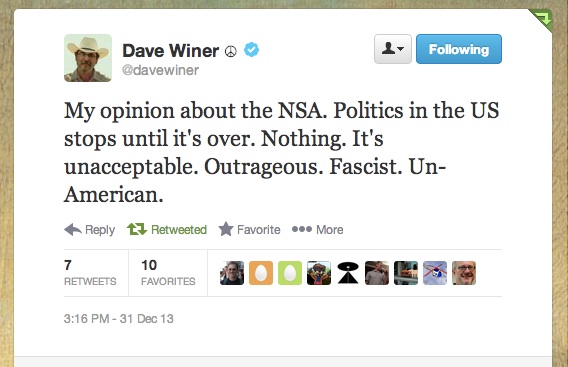Strange what one finds on the Net.
Author Archives: jjn1
Conspiracists and conspiracy theorists
From David Runciman’s LRB review of Alex Ferguson’s fourth shot at autobiography.
Alex Ferguson is a conspiracist, which is not quite the same as being a conspiracy theorist. Conspiracists see patterns of collusion and deceit behind everyday events. Their default position is that someone somewhere is invariably plotting something. Conspiracy theorists go further: they want to join up the dots and discover the overarching pattern that makes sense of seemingly unrelated happenings. They are looking for the single explanation that underwrites everything. A conspiracist thinks that nothing is entirely innocent. A conspiracy theorist thinks that nothing is entirely incidental. Conspiracists can be devious, suspicious, confrontational and difficult to be around but they are also capable of making their way in the world, leveraging their paranoia into real power. Conspiracy theorists are often simply nuts.
Interestingly, though, Fergie and Gordon Brown share an obsessive interest in the assassination of JFK.
Greed is good: Boris Johnson
Interesting snippet from the Mayor’s Margaret Thatcher Lecture:
Like it or not, the free market economy is the only show in town. Britain is competing in an increasingly impatient and globalised economy, in which the competition is getting ever stiffer.
No one can ignore the harshness of that competition, or the inequality that it inevitably accentuates; and I am afraid that violent economic centrifuge is operating on human beings who are already very far from equal in raw ability, if not spiritual worth.
Whatever you may think of the value of IQ tests, it is surely relevant to a conversation about equality that as many as 16 per cent of our species have an IQ below 85, while about 2 per cent have an IQ above 130. The harder you shake the pack, the easier it will be for some cornflakes to get to the top.
And for one reason or another – boardroom greed or, as I am assured, the natural and god-given talent of boardroom inhabitants – the income gap between the top cornflakes and the bottom cornflakes is getting wider than ever. I stress: I don’t believe that economic equality is possible; indeed, some measure of inequality is essential for the spirit of envy and keeping up with the Joneses that is, like greed, a valuable spur to economic activity.
My colleague Andrew Rawnsley picked up on this in his Observer column, and perceives a link to Aldous Huxley’s dystopian vision.
Aldous Huxley called Brave New World, his dark depiction of a future for humankind in which everyone is conditioned to know their place, a “negative utopia”. Children are born into various castes, which are sub-divided into “Plus” and “Minus” members. Each caste is designed to serve predetermined roles in society from which they can never break free. There are the Gammas, Deltas and Epsilons who are bred to do the menial tasks and chemically manipulated to prevent them from wanting to be anything more than they are. At the top sits a tiny elite of Alphas who wield the power.
I don’t know whether the mayor of London is familiar with Huxley’s novel. He might like one of its conceits: to sustain the placidity of the population, recreational and promiscuous sex is strongly encouraged by the state. I am sure he would protest that this was not his intention, but the vision of society that he promotes is not entirely remote from Huxley’s chilling dystopia. The mayor, who presumably regards himself as an Alpha Plus, is effectively telling the person who cleans his office, whom he dismisses as an Epsilon Minus, that their unequal fates are preordained at birth.
“Why on earth enter this territory?” asks one close ally of David Cameron. “Anything that has the whiff of eugenics is just not smart. A lot of people read that and thought, ‘Oh, fuck, Boris. Do you really want to say that?'”
The good news, as Rawnsley observes — and doubtless Tory strategists agree — is that Johnson is doing sterling work reinstating the Tories as the Nasty Party. Long may he continue in this important work.
Wouldn’t it be great if more people thought like this?
John Kay on Obliquity
I’m reading John Kay’s terrific book, Obliquity: Why our goals are best achieved indirectly, and went looking to see if he has given any lectures about it.
Here’s his TEDx talk, which neatly fits the bill.
The Daily Mail in a nutshell
The dangers of linear thinking
Some years ago I watched a mildly-exciting film called The Day After Tomorrow, in which a huge ice-storm plunges the United States into crisis. There are vast rises in sea level (I recall a scene in which a large ship appears to be sailing down Wall Street) and an amusing scene in which a bunch of frozen survivors huddle together in the New York Public Library and keep themselves warm by burning books and possibly bound copies of scientific journals. Some people tried to interpret it as an allegory about global warming, which was patently ludicrous because everybody knows that that is a slow process in which the earth warms by degrees, CO2 concentrations increase linearly and so on, enabling us to watch the orderly, predictable approach of the apocalypse and have time to make the necessary preparations for our survival, if not for the billions of wretches who are too poor or too geographically-challenged to head for the hills.
This way of thinking about processes seems to be hard-wired into the human consciousness. We think in linear terms, of quantities and critical indicators changing monotonically, and this influences the way we think about climate change (to the extent that we think of it at all). Sure, we concede, the climate is changing, and the direction of travel doesn't look good, but it will be quite a while yet before we really hit the critical level and so we don't have to worry too much about it just now.
If the earth's climate were a simple system then that might be a rational strategy. But it's not: it's an exceedingly complex system, which means, among other things, that it's intrinsically unpredictable, is capable of having multiple stable states, and may switch between them with great rapidity. In popular terms, what popularisers like Malcolm Gladwell call "tipping points" are examples of the sudden discontinuities that interactions between feedback loops within a complex system can produce.
What brings this to mind is some stuff I've been reading over the Christmas break, notably this interesting piece in The Nation which collates a number of different sources of information and research to suggest that we might be heading for a significantly nonlinearity which would have a dramatic — and, more importantly – rapid impact on mankind's prospects.
The article and some of the associated links are worth reading at leisure but, in crude terms, the scenario it explores stems from attempts that people are making to assess the implications of the rapid disappearance of arctic sea ice — a process that is definitely under way. One impact of that will be some melting of arctic permafrost, which in turn will release vast amounts of methane into the atmosphere in a relatively short time.
Professor Peter Wadhams, a leading Arctic expert at Cambridge University, has been measuring Arctic ice for forty years, and his findings underscore McPherson’s fears. “The fall-off in ice volume is so fast it is going to bring us to zero very quickly,” Wadhams told a reporter. According to current data, he estimates “with 95% confidence” that the Arctic will have completely ice-free summers by 2018. (US Navy researchers have predicted an ice-free Arctic even earlier—by 2016.)
British scientist John Nissen, chairman of the Arctic Methane Emergency Group (of which Wadhams is a member), suggests that if the summer sea ice loss passes “the point of no return,” and “catastrophic Arctic methane feedbacks” kick in, we’ll be in an “instant planetary emergency.”
Why is this such a big deal?
In the atmosphere, methane is a greenhouse gas that, on a relatively short-term time scale, is far more destructive than carbon dioxide (CO2). It is twenty-three times as powerful as CO2 per molecule on a 100-year timescale, 105 times more potent when it comes to heating the planet on a twenty-year timescale—and the Arctic permafrost, onshore and off, is packed with the stuff. “The seabed,” says Wadham, “is offshore permafrost, but is now warming and melting. We are now seeing great plumes of methane bubbling up in the Siberian Sea…millions of square miles where methane cover is being released.”
According to a study just published in Nature Geoscience, twice as much methane as previously thought is being released from the East Siberian Arctic Shelf, a two million square kilometer area off the coast of Northern Siberia. Its researchers found that at least 17 teragrams (one million tons) of methane are being released into the atmosphere each year, whereas a 2010 study had found only seven teragrams heading into the atmosphere.
So we could be at the beginning of a big 'methane burp'? Nobody really knows what the impact of that might be (though there are some apocalyptic conjectures). For me, the main implication is that linear thinking about climate change might be dangerous.
Google’s robotics drive
This morning’s Observer column.
You may not have noticed it, but over the past year Google has bought eight robotics companies. Its most recent acquisition is an outfit called Boston Dynamics, which makes the nearest thing to a mechanical mule that you are ever likely to see. It’s called Big Dog and it walks, runs, climbs and carries heavy loads. It’s the size of a large dog or small mule – about 3ft long, 2ft 6in tall, weighs 240lbs, has four legs that are articulated like an animal’s, runs at 4mph, climbs slopes up to 35 degrees, walks across rubble, climbs muddy hiking trails, walks in snow and water, carries a 340lb load, can toss breeze blocks and can recover its balance when walking on ice after absorbing a hefty sideways kick.
You don’t believe me? Well, just head over to YouTube and search for “Boston Dynamics”. There, you will find not only a fascinating video of Big Dog in action, but also confirmation that its maker has a menagerie of mechanical beasts, some of them humanoid in form, others resembling predatory animals. And you will not be surprised to learn that most have been developed on military contracts, including some issued by Darpa, the Defence Advanced Research Projects Agency, the outfit that originally funded the development of the internet.
Should we be concerned about this? Yes, but not in the way you might first think…
Cafe society
The importance of being Edward
Opener of my long piece in today’s Observer on the implications of the Snowden revelations.
Whatever else 2013 will be remembered for, it will be known as the year in which a courageous whistleblower brought home to us the extent to which the most liberating communications technology since printing has been captured.
Although Edward Snowden’s revelations initially seemed only to document the extent to which the state had exploited internet technology to create a surveillance system of unimaginable comprehensiveness, as the leaks flowed it gradually dawned on us that our naive lust for “free” stuff online had also enabled commercial interests effectively to capture the internet for their own purposes.
And, as if that realisation wasn’t traumatic enough, Snowden’s revelations demonstrated the extent to which the corporate sector – the Googles, Facebooks, Yahoos and Microsofts of this world – have been, knowingly or unknowingly, complicit in spying on us.
What it boils down to is this: we now know for sure that nothing that you do online is immune to surveillance, and the only people who retain any hope of secure communications are geeks who understand cryptography and use open-source software.
This is a big deal by any standards and we are all in Snowden’s debt, for he has sacrificed his prospects of freedom and a normal life so that the rest of us would know what has happened to the technologies on we now depend. We can no longer plead ignorance as an excuse for alarm or inaction.



